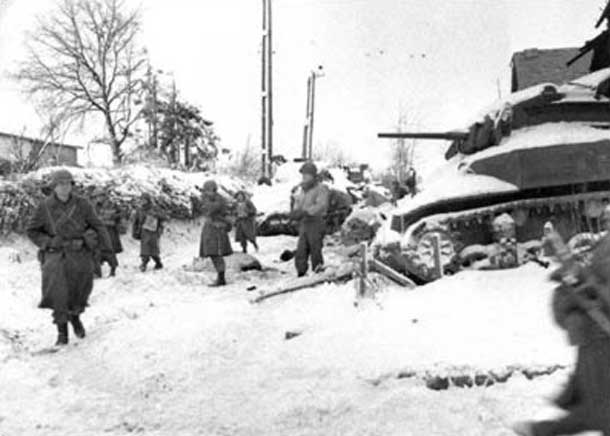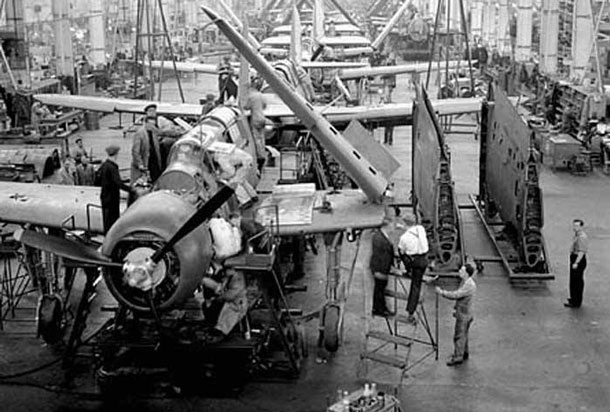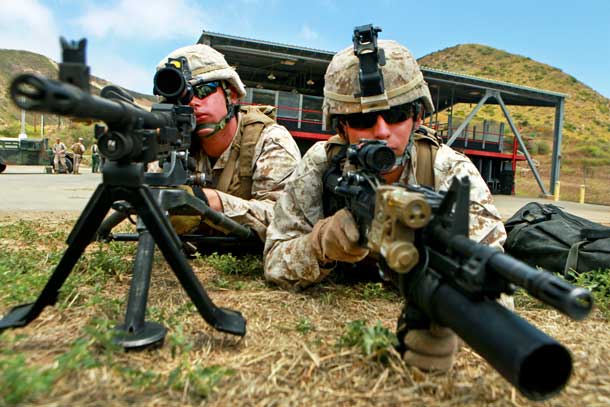
THUNDER BAY – LIVING – December 26th, this day in History.
In 1944 during World War Two, many thought the war in Europe was almost over. The German Army was being rolled back, and Allied forces were advancing.
The Battle of the Bulge (16 December 1944 – 25 January 1945) was a major German offensive campaign launched through the densely forested Ardennes region of Wallonia in Belgium, France, and Luxembourg on the Western Front toward the end of World War II in Europe.
German dictator Adolf Hitler planned the offensive with the primary goal to recapture the important harbour of Antwerp. The surprise attack caught the Allied forces completely off guard. United States forces bore the brunt of the attack and incurred the highest casualties for any operation during the war. The battle also severely depleted Germany’s armored forces on the western front which Germany was largely unable to replace. German personnel and Luftwaffe aircraft also sustained heavy losses.
On Boxing Day, December 26th, the American Army under the leadership of General George S. Patton were able to relieve the encircled Allies in Bastonge.
Nuts!
German commander, Lt. Gen. Heinrich Freiherr von Lüttwitz, requested Bastogne’s surrender. When Brig. Gen. Anthony McAuliffe, acting commander of the 101st, was told of the Nazi demand to surrender, in frustration he responded, “Nuts!”
After turning to other pressing issues, his staff reminded him that they should reply to the German demand. One officer, Lt. Col. Harry Kinnard, noted that McAuliffe’s initial reply would be “tough to beat.” Thus McAuliffe wrote on the paper, which was typed up and delivered to the Germans, the line he made famous and a morale booster to his troops: “NUTS!” That reply had to be explained, both to the Germans and to non-American Allies.
Both 2nd Panzer and Panzer Lehr moved forward from Bastogne after 21 December, leaving only Panzer Lehr’s 901st Regiment to assist the 26th Volksgrenadier Division in attempting to capture the crossroads. The 26th VG received one panzergrenadier regiment from the 15th Panzergrenadier Division on Christmas Eve for its main assault the next day. Because it lacked sufficient troops and those of the 26th VG Division were near exhaustion, the XLVII Panzer Corps concentrated its assault on several individual locations on the west side of the perimeter in sequence rather than launching one simultaneous attack on all sides. The assault, despite initial success by its tanks in penetrating the American line, was defeated and all the tanks destroyed.
The next day, December 26, the spearhead of Gen. Patton’s 4th Armored Division broke through and opened a corridor to Bastogne.
- 1135 – Coronation of King Stephen of England.
- 1481 – Battle of Westbroek: Holland defeats troops of Utrecht.
- 1776 – American Revolutionary War: In the Battle of Trenton, the Continental Army attacks and successfully defeats a garrison of Hessian mercenaries.
- 1790 – Louis XVI of France gives his public assent to Civil Constitution of the Clergy during the French Revolution.
- 1793 – Second Battle of Wissembourg: France defeat Austria.
- 1793 – The wedding of Prince Friedrich Ludwig of Prussia and Frederica of Mecklenburg-Strelitz takes place.
- 1799 – Four thousand people attend George Washington’s funeral where Henry Lee III declares him as “first in war, first in peace and first in the hearts of his countrymen.”
- 1805 – Austria and France sign the Treaty of Pressburg.
- 1806 – Battles of Pultusk and Golymin: Russian forces hold French forces under Napoleon.
- 1811 – A theater fire in Richmond, Virginia kills the Governor of Virginia George William Smith and the president of the First National Bank of Virginia Abraham B. Venable.
- 1825 – Advocates of liberalism in Russia rise up against Czar Nicholas I and are put down in the Decembrist revolt in Saint Petersburg.
- 1846 – Trapped in snow in the Sierra Nevadas and without food, members of the Donner Party resort to cannibalism.
- 1860 – The first ever inter-club association football match takes place between Hallam F.C. and Sheffield F.C. at the Sandygate Road ground in Sheffield, England, United Kingdom.
- 1861 – American Civil War: The Trent Affair: Confederate diplomatic envoys James M. Mason and John Slidell are freed by the United States government, thus heading off a possible war between the United States and United Kingdom.
- 1862 – American Civil War: The Battle of Chickasaw Bayou begins.
- 1862 – Four nuns serving as volunteer nurses on board USS Red Rover are the first female nurses on a U.S. Navy hospital ship.
- 1862 – The largest mass-hanging in U.S. history took place in Mankato, Minnesota, 38 Native Americans died.
- 1870 – The 12.8-km long Fréjus Rail Tunnel through the Alps is completed.
- 1871 – Gilbert and Sullivan collaborate for the first time, on their lost opera, Thespis. It does modestly well, but the two would not collaborate again for four years.
- 1883 – The Harbour Grace Affray between Irish Catholics and Protestant Orangemen causes five deaths in Newfoundland.
- 1898 – Marie and Pierre Curie announce the isolation of radium.
- 1900 – A relief crew arrives at the lighthouse on the Flannan Isles of Scotland, UK, only to find the previous crew has disappeared without a trace.
- 1919 – Babe Ruth of the Boston Red Sox is sold to the New York Yankees by owner Harry Frazee.
- 1925 – Turkey adopts the Gregorian calendar.
- 1941 – U.S. President Franklin D. Roosevelt signs a bill establishing the fourth Thursday in November as Thanksgiving Day in the United States.
- 1943 – World War II: German warship Scharnhorst is sunk off of Norway’s North Cape after a battle against major Royal Navy forces.
- 1944 – World War II: George S. Patton’s Third Army breaks the encirclement of surrounded U.S. forces at Bastogne, Belgium.
- 1948 – Cardinal József Mindszenty is arrested in Hungary and accused of treason and conspiracy.
- 1963 – The Beatles’ “I Want to Hold Your Hand” and “I Saw Her Standing There” are released in the United States, marking the beginning of Beatlemania on an international level.
- 1966 – The first Kwanzaa is celebrated by Maulana Karenga, the chair of Black Studies at California State University, Long Beach.
- 1972 – Vietnam War: As part of Operation Linebacker II, 120 American B-52 Stratofortress bombers attacked Hanoi, including 78 launched from Andersen Air Force Base in Guam, the largest single combat launch in Strategic Air Command history.
- 1976 – The Communist Party of Nepal (Marxist–Leninist) is founded.
- 1982 – Time’s Man of the Year is for the first time a non-human, the personal computer.
- 1991 – The Supreme Soviet of the Soviet Union meets and formally dissolves the Soviet Union.
- 1994 – Four Armed Islamic Group hijackers seize control of Air France Flight 8969. When the plane lands at Marseille, a French Gendarmerie assault team boards the aircraft and kills the hijackers.
- 1996 – Six-year-old beauty queen JonBenét Ramsey is found beaten and strangled in the basement of her family’s home in Boulder, Colorado.
- 1996 – Start of the largest strike in South Korean history.
- 1997 – The Soufrière Hills volcano on the island of Montserrat explodes, creating a small tsunami offshore.
- 1998 – Iraq announces its intention to fire upon U.S. and British warplanes that patrol the northern and southern no-fly zones.
- 1999 – The storm Lothar sweeps across Central Europe, killing 137 and causing US$1.3 billion in damage.
- 2003 – A magnitude 6.6 earthquake devastates southeast Iranian city of Bam, killing tens of thousands and destroying the citadel of Arg-é Bam.
- 2004 – A 9.3 magnitude earthquake creates a tsunami causing devastation in Sri Lanka, India, Indonesia, Thailand, Malaysia, the Maldives and many other areas around the rim of the Indian Ocean, killing over 230,000.
- 2004 – Orange Revolution: The final run-off election in Ukraine is held under heavy international scrutiny.
- 2006 – An oil pipeline in Lagos, Nigeria explodes, killing at least 260.






